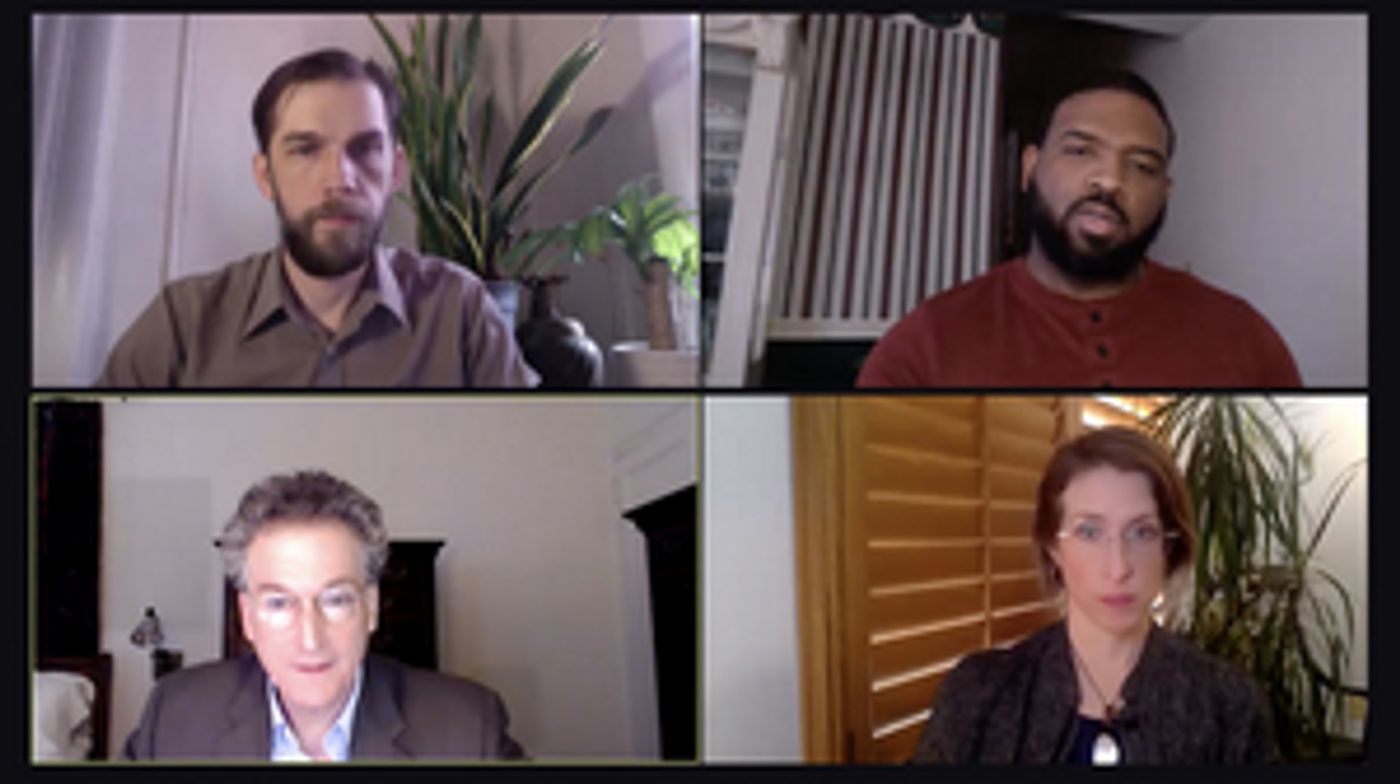Review: On Edge, Online: Spin Cycle and JCS Theater Company's ADJUST THE PROCEDURE Exposes Real College Crises, Virtually
"When someone dies, there are consequences."

Health efficacy and academic bureaucracy clash in ADJUST THE PROCEDURE, a couldn't-be-more-timely play written and directed by Jake Shore. Streaming online through March 15th, the two-act drama set in a Manhattan, New York college exposes the tension among administrators trying to meet the COVID-19 moment.
With staff and students at risk of creating a coronavirus superspreader community, colleges were among the businesses challenged to make some swift decisions: stay open or close? Offer classes in person, online, or cancel them? How to design a viable pandemic-proof business model? How to monitor the health and wellbeing of students who are isolated?
In back-to-back meetings, two deans and two directors gather on Zoom to disclose, debate and deny a rash of compounding crises: student immigration issues, suicidal ideation, COVID on campus, critical support staff missing in action, and professors losing their grip on reality. Adding to the mayhem is infighting over outsourcing; campus mental health services have been transferred to (!) New Jersey.
The play's online format avoids the "big drama reduced to a small space" problem in part because Shore wrote/customized ADJUST THE PROCEDURE with Zoom as the setting. (I watched the performance on a laptop with earbuds, and that helped create a front-row phenomenon of being present at the meetings, not just observing them.) Although none of the actors has much stage business to do in their respective quadrants of the digital grid, their stances and glances help keep the story moving. The show's running time (65 minutes, two acts, no intermission) also helps mitigate Zoom fatigue.
Ed Altman is Frank, the Executive Dean doing his best to captain the scholar ship like it's in cruise mode - dodging questions and spouting quasi-answers with a demeanor that teeters between confident and arrogant. This is obviously not his first time pacifying disgruntled employees; he Dean-splains away each purported "problem" as typical minor challenges of a college operating in the shadow of the pandemic. He tells Kyle (the Director of Academic Development, played by Adam Files), "If you want to be a social worker, go back to school and become one, but do not try to impose duties onto your position that are without merit. This school is not a charity."
As the dean's veneer wears thin, Kyle chips away at it with each new piece of intel and insinuation he brings to the table. Is Kyle compassionate, complicit, conniving or all three? Even he seems unsure: "It's starting to feel like we've stepped into a certain and altogether separate reality." With his eyes on the tenure prize, Kyle is at a moral crossroads and running out of patience.
Ben, the inquisitive Assistant Dean of Student Achievement (Nicholas Miles Newton), holds steady as the check-and-balancing act, prone to asking questions that slow down the meeting: "Kyle, you are asking me questions that you already know the answers to. Why are you doing that?"
Calm, cool, yet still caught in the fray after some "moderate media fallout" is Aimee, the Director of Student Enrollment (Meagan Moses). She tracks the numbers of students and also their classifications - the specificity of which can make or break the college's financial future. She goes with the flow until she doesn't - a memorable patriarchy-smashing moment.
On edge, online and on each other's nerves, each employee divulges a troubling little something about themselves in word or deed to remind us that, for better or for worse, institutions are comprised of people with power making policy. And although enrollment numbers are ostensibly at the root of these administrators' conflict, the students behind those numbers are ultimately the invisible and vulnerable benefactors. Unseen, unheard and often unwell, the students are much more than statistics but far less than supported.
ADJUST THE PROCEDURE (65 minutes, no intermission), streaming through March 14th on Stellar. Tickets are $10, available here.
Reader Reviews
Videos


